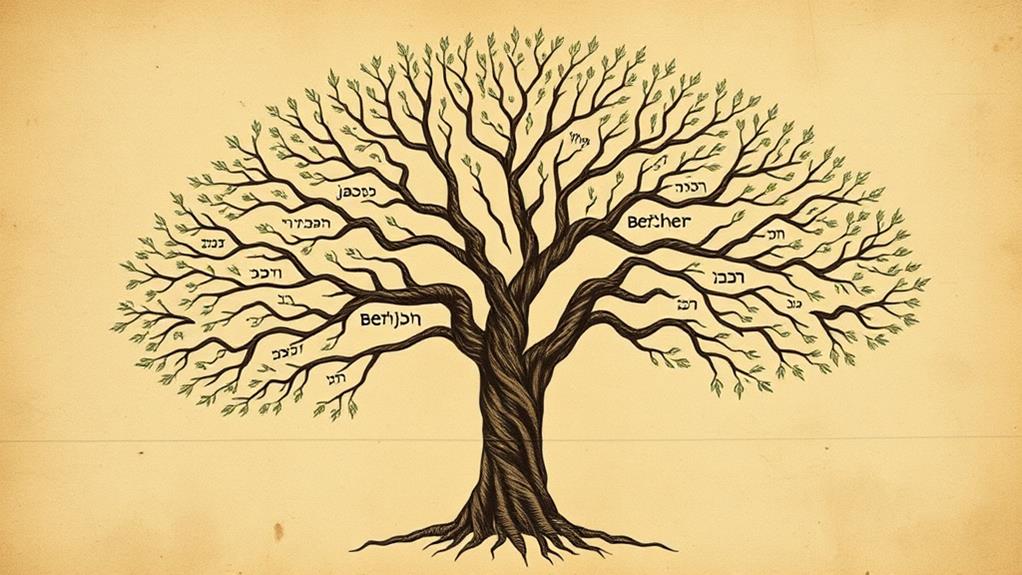Zemirah Name Meaning in the Bible
The name Zemirah in the Bible holds profound significance, originating from the Hebrew verb *zamar*, meaning to prune and sing or praise. It symbolizes joy, harmony, spiritual growth, and unity in worship, reflecting the musical and poetic traditions of the Israelites. In the lineage of Benjamin, Zemirah’s inclusion underscores the ancestral ties and genealogical roots of the Israelites, emphasizing God’s covenant with Israel and faithfulness across generations. Through its etymology and biblical context, Zemirah offers a rich tapestry of theological insights and cultural heritage, inviting exploration into the deeper meanings and significance embedded in its ancient roots.
Key Takeaways
- Zemirah’s Hebrew origin: The name Zemirah originates from the Hebrew verb *zamar*, meaning to prune and to sing or praise, reflecting musical and agricultural themes.
- Genealogical significance: Zemirah is mentioned in 1 Chronicles 7:8 as a son of Becher, a descendant of Benjamin, emphasizing ancestral ties and genealogical roots.
- Cultural significance: The name symbolizes joy, harmony, spiritual growth, and unity in worship, connecting to musical and poetic traditions of the Israelites.
- Theological significance: Zemirah’s inclusion in lineage highlights God’s covenant with Israel and emphasizes God’s faithfulness across generations.
- Symbolic context: The name embodies celebratory and worshipful aspects of Israel’s history, enriching understanding of the biblical narrative and God’s relationship with His people.
Biblical Origin of Zemirah

The biblical origin of Zemirah is deeply rooted in the Hebrew language and is closely associated with the concept of song and praise. Deriving from the Hebrew verb זָמַר (*zamar*), which encompasses two primary meanings: to prune and to sing or praise, Zemirah embodies the essence of musical expression and joy. This name reflects themes of renewal and divine purpose, resonating with the biblical narratives that emphasize the significance of worship and celebration in life.
Linguistic origins play a significant role in understanding the depth of Zemirah’s meaning. The name is linked to the masculine noun זמיר (*zamir*), meaning song, and the feminine noun זמרה (*zimra*), also signifying song. This dual connection underscores the symbolic interpretations of Zemirah as a name that encapsulates the spirit of music and reverence.
Symbolic interpretations further enrich the significance of Zemirah. As part of the tribe of Benjamin, Zemirah’s inclusion in the biblical genealogies (1 Chronicles 7:8) highlights the importance of lineage and heritage in the biblical narrative.
The name’s association with song also symbolizes joy and praise, reflecting the biblical emphasis on worship and celebration. Through Zemirah, we see the intertwining of linguistic origins and symbolic meanings, illustrating the rich tapestry of biblical names.
Spiritual Significance in Scripture
Theological implications are profound, highlighting the role of music in the scriptural narrative. In the Bible, songs are often used to praise God, recount His faithfulness, and celebrate His deliverance. The name Zemirah underscores this scriptural application, symbolizing the joy and harmony that emerge from a deep connection with the divine.
This connection resonates with the biblical meaning of 123, which emphasizes spiritual growth and harmony as believers come together in worship and unity.
Scriptural references to music underscore its power to unite people in worship and to express gratitude for God’s blessings. Therefore, Zemirah’s spiritual significance extends beyond its etymological meaning, evoking a broader biblical symbolism that emphasizes the importance of music as a medium for spiritual communication and community building.
This understanding is vital for interpreting Zemirah’s role within the biblical narrative, illustrating how names in Scripture often carry profound theological implications that guide scriptural application.
Historical Context of the Name

The name Zemirah holds significant importance within the biblical context, particularly in the genealogical records in 1 Chronicles 7:8, where it is identified as the name of one of the sons of Becher, a descendant of Benjamin. This name’s etymological roots in the Hebrew verb *zamar*, meaning to prune or praise, suggest a dual significance that reflects both agricultural and musical themes, highlighting its cultural impact during that time.
The themes of praise and divine favor resonate closely with the biblical significance of names such as Ashley, which symbolize strength and resilience, often associated with blessings and joy, as seen in the significance of names. The inclusion of Zemirah in these genealogical records underscores the meticulous attention to lineage in biblical tradition, serving as a proof to God’s faithfulness across generations.
Biblical Genealogical Significance
The inclusion of Zemirah in this lineage highlights the continuity of God’s covenant with Israel, tracing the lineage through which the Messiah would come. It demonstrates God’s faithfulness across generations, emphasizing His personal involvement in the lives of His people.
This genealogical significance underscores God’s sovereignty, guiding history according to His will. For modern Christians, this serves as a powerful reminder of God’s faithfulness to His promises, not just in the immediate moment but across generations, reassuring us that we are each an essential part of His redemptive story.
The biblical lineage of Zemirah carries profound spiritual meaning, illustrating the intricate connection between individual lives and the broader divine plan.
Etymological and Cultural Impact**
Understanding the etymological and cultural impact of the name Zemirah requires a closer examination of its Hebrew origins. The name Zemirah is derived from the Hebrew verb “zamar,” which means to sing or praise, and is closely associated with musical and melodic themes. This etymological root provides a significant cultural context, reflecting the importance of music and worship in Hebrew culture.
In a similar vein to names like Vanessa, which symbolize the bearer of good news, Zemirah also embodies the essence of spiritual expression through song and praise, emphasizing the connection between music and divine favor spiritual significance.
In the biblical context, Zemirah is mentioned as the son of Becher, a descendant of Benjamin, emphasizing the lineage and genealogical significance within the Hebrew tradition. The use of the name Zemirah within this framework underscores the role of music and praise in the spiritual and cultural practices of the ancient Israelites.
The cultural influences of the name Zemirah are evident in its association with the Hebrew tradition of praising God through song and music. The name serves as a reminder of the rich cultural heritage of the Israelites, highlighting the central role of music and worship in their religious practices. By exploring the etymological origins and cultural influences of the name Zemirah, we gain a deeper understanding of its historical significance and the values it carries.
Symbolic Meaning in Hebrew
In Hebrew, Zemirah encapsulates a profound symbolic meaning, primarily deriving from the verb *zamar*, which encompasses dual actions: to prune or to praise. This duality is significant in Hebrew symbolism, as it reflects the balance between refining and expressing joy through song.
The name’s association with the biblical figure Zemirah, a son of Becher in 1 Chronicles 7:8, underscores its connection to the lineage of Benjamin, a tribe known for its spiritual and cultural contributions to Israel’s history.
The etymology of Zemirah, linked to the verb *zamar*, indicates a deep connection with both physical cultivation (pruning) and spiritual expression (praise). This dichotomy highlights the importance of balance and harmony in life, echoing the themes found in various psalms and Hebrew writings.
In biblical interpretation, the name Zemirah is more than just a designation; it symbolizes a reflection of the divine interactions between God and His people, emphasizing the value of both physical and spiritual stewardship. This multifaceted meaning enriches the name Zemirah, making it a compelling choice for those seeking names with rich biblical significance and Hebrew symbolism.
Zemirah in the Genealogy of Benjamin

The name Zemirah, derived from the Hebrew word זְמִירָה (Zemirah), meaning “song” or “melody,” holds significant cultural and familial roots in the Biblical context.
It appears in 1 Chronicles 7:8 as part of the lineage of the tribe of Benjamin, reinforcing the importance of genealogical records in the Old Tradition.
These records not only serve as historical narratives but also underscore the theological significance of family lineage in understanding God’s covenant with Israel.
Biblical Genealogical Significance
Regarded as a pivotal figure within the intricate genealogical tapestry of the Bible, Zemirah is mentioned in 1 Chronicles 7:8 as one of the sons of Becher, a descendant of Benjamin, the youngest son of Jacob (Israel). This inclusion underscores the importance of family connections and biblical lineage in understanding the broader narrative of the Bible.
The mention of Zemirah in the genealogy of Benjamin highlights the ancestral ties and genealogical roots that are central to the Israelites’ preservation of their heritage.
The genealogical records in the Bible, including those in 1 Chronicles, serve not only as historical documents but also as theological affirmations that confirm the continuity of God’s covenant with Israel. The meticulous recording of names like Zemirah’s reflects the Israelites’ understanding of the significance of lineage in God’s plan.
Moreover, the inclusion of Zemirah in the biblical genealogy illustrates the care with which the Israelites preserved their heritage, emphasizing the importance of family and ancestral connections in the divine record. This attention to detail underscores the sovereignty of God and His faithfulness across generations.
Cultural and Familial Roots**
Zemirah’s presence in the biblical genealogy of Benjamin reveals an engrossing narrative that delves into the cultural and familial roots of the Israelites. Being the son of Becher and part of the lineage of Benjamin, Zemirah’s name reflects the significance of cultural traditions and family heritage in the biblical context. The name Zemirah, derived from the Hebrew word for “song” or “melody,” suggests a strong connection to the musical and poetic traditions of the Israelites.
In the broader context of the Bible, the genealogies serve not only as historical records but also as theological documents that underscore the continuity of God’s covenant with Israel. The inclusion of Zemirah in these genealogies highlights the importance of family lineage in understanding God’s redemptive plan.
Moreover, the meticulous recording of these genealogies demonstrates how the Israelites preserved their heritage, emphasizing the role of each individual in the unfolding narrative of God’s people. In this way, Zemirah’s mention contributes to the rich tapestry of biblical history, weaving together cultural traditions and family heritage into a narrative of divine purpose.
Theological Insights From Zemirah’s Name**
Delving into the theological insights from Zemirah‘s name reveals profound meanings rooted in the Hebrew Bible. The name Zemirah, deriving from the verb זמר (zamar), which means either “to prune” or “to praise,” offers a multifaceted understanding of its significance.
From a theological perspective, the inclusion of Zemirah in the biblical genealogies highlights the intricate and intentional nature of God’s plan. The genealogies in 1 Chronicles, where Zemirah is mentioned (1 Chronicles 7:8), serve as more than historical records; they underscore the continuity of God’s covenant with Israel. Each name, including Zemirah, represents a link in the chain of God’s faithfulness across generations.
Moreover, the linguistic analysis of Zemirah reveals cultural interpretations that reflect the importance of lineage in God’s redemptive plan. The name’s association with music or song underscores the celebratory and worshipful aspects of Israel’s history, encapsulating the joy and praise that are central to Hebrew culture.
This intersection of linguistic and theological insights enriches our understanding of the biblical narrative, emphasizing the divine attention to detail and the personal nature of God’s relationship with His people.
Frequently Asked Questions
What Is the Correct Pronunciation of the Name Zemirah?
The correct pronunciation of the name Zemirah is zeh-mee-ruh. With its Hebrew origin, it holds a deep cultural significance rooted in biblical contexts, reflecting a meaning of “song of joy” or “my praise”.
Is Zemirah Considered a Unisex or Gender-Specific Name?
In a world where names are as vast as the stars, the query about Zemirah’s gender specificity shines bright. Linguistic analysis reveals that Zemirah is indeed a gender-neutral name, boasting a rich cultural significance rooted in its biblical origins.
How Popular Is the Name Zemirah in Modern Naming Trends?
Zemirah’s popularity is relatively low compared to other biblical names, with 36 records in 2021 in the US. The name’s unique cultural significance varies by region, appealing to parents seeking distinctive names with modern flair.
Are There Any Common Nicknames or Variations of the Name Zemirah?
Freedom seekers rejoice Zemirah nicknames abound. Try Zemi or Mira for a modern twist. In the biblical naming tradition, nicknames held significant cultural value, symbolizing affection and familiarity. Zamirah, Zemyra, and Zemira are also on the table.
Does the Name Zemirah Have Any Arabic Roots or Connections?
No Arabic Roots Identified: The name Zemirah primarily has Hebrew and Biblical origins, derived from the verb *zamar*, meaning ‘to prune or praise’. There is no direct Arabic influence or connection associated with its etymology.
Unique Female Figures in the Bible
- Jael Name Meaning in the Bible
- Josiah Name Meaning in the Bible
- Kiara Name Meaning in the Bible
- Zemirah Name Meaning in the Bible
- Zaiah Name Meaning in the Bible
Conclusion:
Zemirah, a name derived from the Hebrew term for “song” or “melody,” holds deep biblical and spiritual significance. Mentioned as one of Becher’s sons in the Bible, it underscores God’s faithfulness and sovereignty over the genealogical record of Israel. The name serves as an attestation to the importance of worship and lineage in God’s plan, offering profound insights into the personal nature of God’s relationship with His people.






